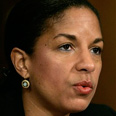
6 powers agree to further Iran sanctions talks
Envoys of Britain, China, France, Russia, US, Germany, mull draft resolution on fourth round of sanctions against Revolutionary Guards over nuclear program. US envoy says, 'We look forward to continuing discussions in days to come', while Russian representative says, 'We heard some constructive proposals'
Six major powers agreed to further talks on new UN sanctions against Iran in the days ahead as the US and Russian leaders warned Tehran that its continued nuclear defiance would not be tolerated.
Envoys of Britain, China, France, Russia, the United States and Germany huddled for nearly three hours behind closed doors to mull a US draft resolution that would slap sanctions on Iran's powerful Revolutionary Guards believed to be involved in nuclear proliferation activities.
"We had a worthwhile discussion," US Ambassador to the UN Susan Rice told reporters at the end of the meeting held at Britain's UN mission here. "We look forward to continuing these discussions here in New York and in capitals in the days and weeks to come." she added.
Earlier Thursday, Rice said at UN headquarters: "I am not prepared to predict when they (the talks) will conclude or not...We are working to get this done swiftly, within a matter of weeks in the spring."
Her Russian counterpart Vitaly Churkin meanwhile emerged from the meeting, saying: "We heard some constructive proposals."
In Prague, US and Russian presidents Barack Obama and Dmitry Medvedev warned Iran of possible sanctions shortly after signing a new landmark strategic arms reduction treaty.The two leaders said Iran could expect a fourth round of UN sanctions if it maintains its refusal to halt uranium enrichment and cooperate with UN atomic watchdog inspectors.
'Will pursue diplomatic solution'
In New York, China's UN Ambassador Li Baodong said after the meeting that the six powers would continue to pursue a diplomatic solution even as they sought a deal over sanctions to persuade Tehran to halt its uranium enrichment program.
"The dual track (sanctions coupled with negotiations) approach is actually focused on diplomacy," Li said, adding that fresh talks were planned for next week. Churkin echoed those remarks.
China, which for weeks had resisted discussing in earnest the specific proposals agreed by the United States and its key European allies, finally relented and agreed to join the ambassador-level discussions in New York.
Obama called for "smart" and "strong" sanctions by the United Nations, which in May will hold a review conference on the nuclear Non-Proliferation Treaty.
"I have said many times that sanctions very often do not work, but sometimes they are necessary.... These need to be smart sanctions, capable of prompting the right behavior," Medvedev added.
The 15-member UN Security Council, including China, has already imposed three sets of sanctions on Iran over its refusal to halt uranium enrichment.
To avoid a fourth round of sanctions, Russia and China have tried unsuccessfully to coax Iran into accepting a UN-brokered deal under which it would send 1,200 kilograms (2,640 pounds) of its low-enriched uranium (LEU) - enough to build a nuclear bomb - to France and Russia for conversion into fuel for its Tehran research reactor.
But Iranian officials have refused to hand over Tehran's stockpiles of LEU, insisting on a simultaneous exchange of the material for the fuel within the borders of the Islamic Republic. World powers oppose this condition.
Meanwhile the State Department said efforts to pressure Iran to curtail its nuclear ambitions will also be a "significant" topic during next week's nuclear summit in Washington. "We continue to do everything we can to produce an appropriate resolution as soon as possible and we're very mindful of the timetable," State Department spokesman Philip Crowley said.
'Iran won't beg world'
Iran's hardline President Mahmoud Ahmadinejad however said Thursday he would not beg the world powers to refrain from imposing new sanctions on the Islamic Republic.
And Iran's top general, Hassan Firouzabadi, warned that if Washington attacks the Islamic Republic none of the American soldiers in the region will return home alive, the Fars news agency reported.
Firouzabadi's comments come a day after Ahmadinejad warned Obama of a tough response as he lashed out against Washington's new nuclear doctrine.
"Be careful. If you set step in Mr. (George W.) Bush's path, the nations' response would be the same tooth-breaking one as they gave Bush," Ahmadinejad said Wednesday.
A day earlier, the US leader said for the first time that countries without atomic weapons that complied with non-proliferation treaty obligations need not fear a US nuclear attack.
But Obama also warned that exceptions could be made for "outliers" such as Iran and North Korea, both of which are accused by the West of flouting UN resolutions.










